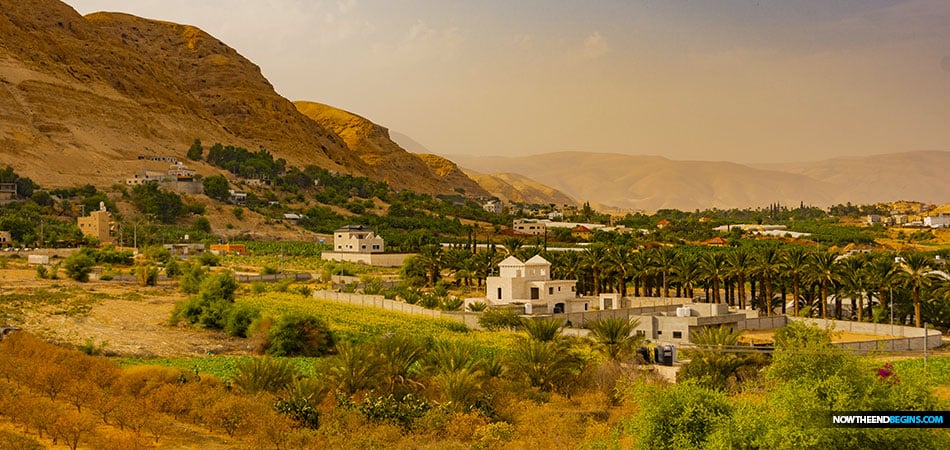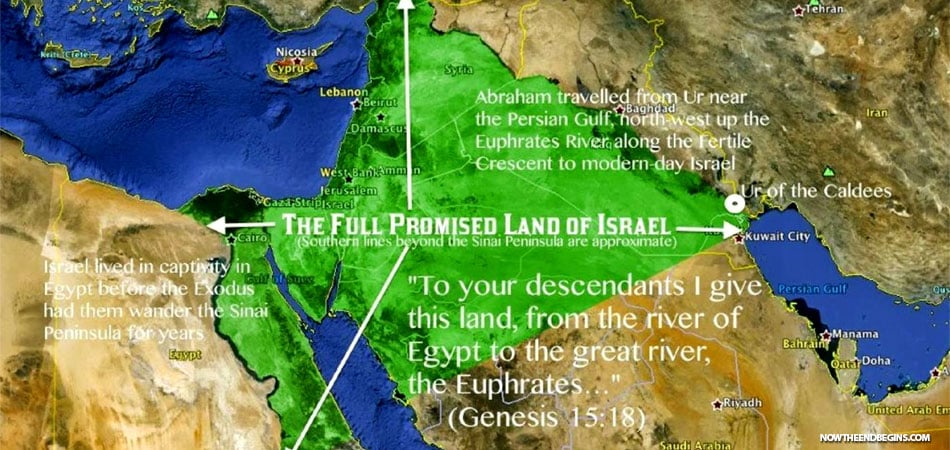
Just days before Israel was to hold national elections, Prime Minister Benjamin Netanyahu promised to annex parts of the West Bank as Israeli territory. Now he has the clout to keep it.
There are few people on this planet who are having a better week than newly-reelected Israeli PM Benjamin Netanyahu. Not only did he
win an historic election which will make him the longest server leader of Israel, but he has had a giddy two-and-a-half years of watching a dizzying array of items from his 'dream list' being granted him by American president Donald Trump. So the question now is, just how far will Netanyahu really go?
"Be it known unto the king, that we went into the province of Judea, to the house of the great God, which is builded with great stones, and timber is laid in the walls, and this work goeth fast on, and prospereth in their hands. Then asked we those elders, and said unto them thus, Who commanded you to build this house, and to make up these walls?" Ezra 5:9 (KJV)
As bible believers, we known for a fact that
all of the land of Israel belongs to the Jews, and that in the
Millennial Reign of King Jesus from Jerusalem, that Israel will once again fill the borders of
God's original land grant to Abraham. Netanyahu has zero interest in a
Two-State Solution, and I believe he will spend his newly-minted political capital on expanding Israel's borders in a very meaningful way. And why not? This is likely his last term, he knows it, now he goes for the really big fish.
Of course, given the global hatred for Israel, as Netanyahu begins to makes these moves, expect to see huge backlash from the United Nations and other anti-semitic groups. These are the days of prophecy, and a very exciting time to be alive and looking for the Lord's return to come
catch His Bride away before the time of Jacob's trouble.
NETANYAHU’S PROMISE TO ANNEX THE WEST BANK SETTLEMENTS, EXPLAINED
FROM THE JERUSALEM POST: “I’m going to extend sovereignty,” he said in an interview with Israeli Channel 12 on Saturday night, adding that “I don’t differentiate between the settlement blocs and isolated settlements.”
The campaign promise is a last-minute bid to draw right-wing votes in a tight election race. But what does annexing West Bank settlements mean? How would it affect Israeli-Palestinian peace talks, and the general geography of the Jewish state? Will it actually happen?
Here’s what you need to know.
What is the West Bank?
The West Bank is a territory sandwiched between Israel and Jordan named for its location: the western bank of the Jordan River. About 2.5 million Palestinians and 400,000 Jewish Israelis live there.
Jordan conquered the West Bank after Israel’s 1948 War of Independence. Then Israel captured the territory from Jordan in the 1967 Six-Day War, but never fully annexed it into the country. So for more than 50 years, the West Bank has been controlled by Israel, but its status has been under debate.
The debate is over who should control the area in the future. Palestinians, most of the international community and the Israeli left see it now as occupied Palestinian territory. They say Israel’s control is illegal and want the West Bank (or nearly all of it) to be the site of a Palestinian state. But Israel’s government says it rightfully controls the West Bank.
So is the West Bank part of Israel?
Not officially, no. The State of Israel has controlled the area, sometimes known in Israel by its biblical name, Judea and Samaria, for half a century without annexing it. That is what could change if Netanyahu wins and makes good on his promise.
Many Israelis believe it’s already part of the country. The Israeli right, and some Israel supporters abroad, see the West Bank as disputed territory that doesn’t belong to Palestinians. They say Israel controls it legally because it was won in a defensive war — the third in the country’s first 20 years of existence.
And religious Zionist Israelis (who are mostly on the right) often talk about the West Bank as the heartland of the biblical Land of Israel. Historically, and by Jewish tradition, this is where the Jewish patriarchs lived and where many of the events of the Bible took place.
"In the same day the LORD made a covenant with Abram, saying, Unto thy seed have I given this land, from the river of Egypt unto the great river, the river Euphrates: The Kenites, and the Kenizzites, and the Kadmonites, And the Hittites, and the Perizzites, and the Rephaims, And the Amorites, and the Canaanites, and the Girgashites, and the Jebusites." Genesis 15:18-21 (KJV)

WHO’S OCCUPYING WHO? LET’S LOOK AT GOD’S ORIGINAL LAND GRANT OF THE NATION OF ISRAEL TO ABRAHAM
Hold on. So it isn’t technically part of Israel, but Israelis live there?
Yes: Welcome to the settlements. After Israel conquered the West Bank, groups of Jews from left to right established villages there. Some of the settlements deep in the West Bank are fiercely ideological and religious communities. Many others are middle-class suburbs of Jerusalem and Tel Aviv, distinguishable from pre-1967 Israel only by their location and some added security measures.
Most of the big settlements (and most of the settlers) are close to the Green Line — the name for the internationally agreed-upon border between the West Bank and Israel. The total population of the settlements has grown to more than 400,000 today.
Most of the international community sees the settlements as illegal. Palestinians see the settlements as colonies that prevent them from achieving statehood, and blame the residents there for inflicting violence on them. The settlers and their defenders see the settlements as a security bulwark against Palestinian terrorism in the West Bank and Israel.
And Israel’s government sees the settlements as legitimate. Religious Israelis say that the settlements are a manifestation of Jews returning to the land God gave them.
Where does that leave the Palestinians?
Here’s where it gets even more complicated. Palestinians do not have citizenship in Israel, the right to vote and freedom of movement. They are under varying degrees of Israeli control.
For about 25 years, the West Bank has been divided into three areas. Area A is fully under Palestinian control — run by Palestinian institutions, guarded by Palestinian security forces and subject to Palestinian laws. The Israeli army does conduct operations there, but its presence is relatively minimal.
Area B is mixed: subject to Palestinian civil laws, but under the control of the Israeli army. The vast majority of Palestinians live in Areas A and B.
Area C is everything else, and it’s fully controlled by the Israeli army. This is where all of the settlers, and a small number of Palestinians, live. It takes up about 60 percent of the West Bank’s total land area.
The three areas aren’t neatly sliced. They are interspersed with each other in a maze-like tapestry.
How would annexation change things?
Annexation would make some or all of the settlements officially part of Israel. This is a huge deal.
For 50 years, Israel has been holding the West Bank in a kind of temporary capacity and repeatedly has offered to cede nearly all of it in a peace agreement. This would make the annexed settlements as much a part of Israel — under Israeli law — as Tel Aviv. In Israel’s eyes, there would be no difference between the annexed settlements and the rest of the country.
The international community would likely protest annexation, and strongly, and Palestinians almost surely would. Commanders for Israel’s Security, a group of retired Israeli military officers that supports establishing a Palestinian state, predicts that annexation will lead to the collapse of the Palestinian Authority, which governs the Palestinian areas of the West Bank. The group says annexing all of the settlements will cost Israel $2.35 billion.
READ MORE
No comments:
Post a Comment